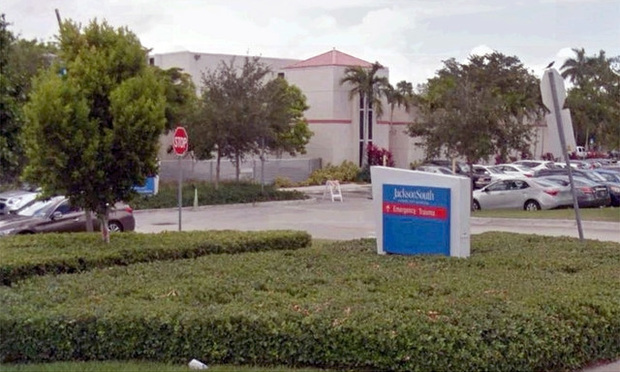Senate Legislation Could End Florida's Trauma System Battles
The legal dramas that have swirled around Florida's trauma system in recent years would be settled under a bill that revamps rules and regulations and recognizes trauma centers at some HCA Healthcare facilities across the state.
March 07, 2018 at 04:31 PM
4 minute read

The legal dramas that have swirled around Florida's trauma system in recent years would be settled under a bill that revamps rules and regulations and recognizes trauma centers at some HCA Healthcare facilities across the state.
The Senate on Tuesday voted unanimously to pass the bill (HB 1165), one day after the House voted 110-0 to approve it. The bill now heads to Gov. Rick Scott, who is expected to sign it into law.
Senate Health Policy Chairwoman Dana Young, a Tampa Republican who started meeting with various hospital representatives last summer on the trauma issue, said the bill ends years of legal wrangling and adds provisions aimed at preventing the litigation from ever occurring again.
Young told The News Service of Florida there were “hours and hours of meetings” with representatives of various hospitals, including Jackson Memorial in Miami-Dade County, HCA and “safety net” facilities.
“I asked them,” Young said, recalling the meetings, “how much do they really want to get this done?”
The Legislature for the past several years has grappled with the trauma system and whether to continue with current regulations or to allow a more competitive environment that would increase the number of trauma facilities in the state.
The debate has come after HCA moved to open several trauma centers, which drew legal challenges from hospitals that have long operated trauma facilities.
Under current law and regulations, Florida has a statewide cap of 44 trauma centers, with facilities allocated to 19 “trauma service areas.” It also includes different classifications of trauma centers based, in part, on levels of care they provide.
Supporters of the long-standing limits on trauma centers have contended that the facilities are expensive to operate and require highly trained doctors and staff members. But HCA and its backers say opening more trauma centers helps improve access to care for severely injured patients.
The bill would change the number of trauma-service areas from 19 to 18 and make clear that no service area could have more than a total of five Level I, Level II, Level II/pediatric, and stand-alone pediatric trauma centers. A trauma service area could not have more than one stand-alone pediatric trauma center.
The bill would require the Florida Department of Health by Oct. 1 to establish an 11-member Florida Trauma System Advisory Council. The group would be required to meet no later than Jan. 5 and quarterly thereafter.
Moreover, the bill would put into statutes a new “need formula” for the approval of trauma centers. Under the new formula, it will be difficult to produce new trauma centers any time soon, said Mark Delegal, general counsel for the Safety Net Hospital Alliance of Florida, which includes public, teaching and children's hospitals.
Delegal said the bill will ensure a quality trauma system for the foreseeable future and bring to an end years of litigation.
“Importantly, the bill recreates a trauma advisory council with leading experts to maintain and improve trauma care in Florida,” he said.
The bill “grandfathers” in three HCA trauma centers: Kendall Regional Medical Center's Level I trauma center, which allows it to operate a pediatric trauma center; Orange Park Medical Center's Level II trauma center; and Aventura Hospital and Medical Center's Level II trauma center.
A fourth HCA facility, Northside Hospital in St. Petersburg, would be prevented from moving ahead with a trauma center.
The agreement also gives Jackson South in Miami the ability to open a trauma center. Along with Young, the legislation was sponsored by Rep. Jay Trumbull, R-Panama City.
Christine Sexton reports for the News Service of Florida.
This content has been archived. It is available through our partners, LexisNexis® and Bloomberg Law.
To view this content, please continue to their sites.
Not a Lexis Subscriber?
Subscribe Now
Not a Bloomberg Law Subscriber?
Subscribe Now
NOT FOR REPRINT
© 2025 ALM Global, LLC, All Rights Reserved. Request academic re-use from www.copyright.com. All other uses, submit a request to [email protected]. For more information visit Asset & Logo Licensing.
You Might Like
View All

Holland & Knight Expands Corporate Practice in Texas With Former Greenberg Traurig Partner
3 minute read
Forum Clause Axes $844M Case Against Reinsurer Over Deadly Plane Crash, Judge Rules

Latest Boutique Combination in Florida Continues Am Law 200 Merger Activity
3 minute readTrending Stories
- 1Thursday Newspaper
- 2Public Notices/Calendars
- 3Judicial Ethics Opinion 24-117
- 4Rejuvenation of a Sharp Employer Non-Compete Tool: Delaware Supreme Court Reinvigorates the Employee Choice Doctrine
- 5Mastering Litigation in New York’s Commercial Division Part V, Leave It to the Experts: Expert Discovery in the New York Commercial Division
Who Got The Work
J. Brugh Lower of Gibbons has entered an appearance for industrial equipment supplier Devco Corporation in a pending trademark infringement lawsuit. The suit, accusing the defendant of selling knock-off Graco products, was filed Dec. 18 in New Jersey District Court by Rivkin Radler on behalf of Graco Inc. and Graco Minnesota. The case, assigned to U.S. District Judge Zahid N. Quraishi, is 3:24-cv-11294, Graco Inc. et al v. Devco Corporation.
Who Got The Work
Rebecca Maller-Stein and Kent A. Yalowitz of Arnold & Porter Kaye Scholer have entered their appearances for Hanaco Venture Capital and its executives, Lior Prosor and David Frankel, in a pending securities lawsuit. The action, filed on Dec. 24 in New York Southern District Court by Zell, Aron & Co. on behalf of Goldeneye Advisors, accuses the defendants of negligently and fraudulently managing the plaintiff's $1 million investment. The case, assigned to U.S. District Judge Vernon S. Broderick, is 1:24-cv-09918, Goldeneye Advisors, LLC v. Hanaco Venture Capital, Ltd. et al.
Who Got The Work
Attorneys from A&O Shearman has stepped in as defense counsel for Toronto-Dominion Bank and other defendants in a pending securities class action. The suit, filed Dec. 11 in New York Southern District Court by Bleichmar Fonti & Auld, accuses the defendants of concealing the bank's 'pervasive' deficiencies in regards to its compliance with the Bank Secrecy Act and the quality of its anti-money laundering controls. The case, assigned to U.S. District Judge Arun Subramanian, is 1:24-cv-09445, Gonzalez v. The Toronto-Dominion Bank et al.
Who Got The Work
Crown Castle International, a Pennsylvania company providing shared communications infrastructure, has turned to Luke D. Wolf of Gordon Rees Scully Mansukhani to fend off a pending breach-of-contract lawsuit. The court action, filed Nov. 25 in Michigan Eastern District Court by Hooper Hathaway PC on behalf of The Town Residences LLC, accuses Crown Castle of failing to transfer approximately $30,000 in utility payments from T-Mobile in breach of a roof-top lease and assignment agreement. The case, assigned to U.S. District Judge Susan K. Declercq, is 2:24-cv-13131, The Town Residences LLC v. T-Mobile US, Inc. et al.
Who Got The Work
Wilfred P. Coronato and Daniel M. Schwartz of McCarter & English have stepped in as defense counsel to Electrolux Home Products Inc. in a pending product liability lawsuit. The court action, filed Nov. 26 in New York Eastern District Court by Poulos Lopiccolo PC and Nagel Rice LLP on behalf of David Stern, alleges that the defendant's refrigerators’ drawers and shelving repeatedly break and fall apart within months after purchase. The case, assigned to U.S. District Judge Joan M. Azrack, is 2:24-cv-08204, Stern v. Electrolux Home Products, Inc.
Featured Firms
Law Offices of Gary Martin Hays & Associates, P.C.
(470) 294-1674
Law Offices of Mark E. Salomone
(857) 444-6468
Smith & Hassler
(713) 739-1250






